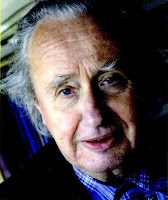I have been writing about great podcasts for nearly a year and all the time I have been assuming that you, the readers, know where to find those podcasts and how to listen to them. However, that need not be so. Hence I thought I should start an article series to guide you into getting access to those podcasts I write about.
Instruction 1: listen on-lineThe quickest way to listen to a podcast is to listen to it on-line. Nearly all podcasts are related to a site and supply a link or a button for listening. Suppose I write about a podcast in the
Shrink Rap Radio series and you decide you want to listen to that one.
Notice that my review always contains a link to the particular show, mostly like this: Shrink Rap Radio show #148
Ego States Psychotherapy. There is the link to click on and it brings you to the web page of this particular issue of the Shrink Rap Radio show.
The bulk of that page looks like this:

On the bottom left you see a button. Click there and the show will play in your browser:

This should work most of the time, but I am presupposing a couple of circumstances.
For one, I assume you have a computer with speakers or head phones and a sound card, so that the computer is capable of playing sound.
Second, I assume your browser (Internet Explorer for most, though my statistics show some 50% of my readers use FireFox) is prepared and allowed to deal with your click on the play button. This will involve a media player on your computer to be called or a 'plug-in ' in the browser that allows for playing embedded in the browser. Most computers have a media player, especially if they are fit with hardware for playing sound, but browsers do not always have all plug-ins installed to play all sorts of audio files. If however you clicked and the plug-in needed is not there, the browser will prompt you with an offer to install the program. Once you have gone through the steps (the browser and installer will guide you) you will be able to play this audio in the future.
You may also have some trouble finding the button to click for listening to the file. These buttons are not standard and therefore may look different from the given example and may be placed on the page on various points. Look around, you will eventually find them. If there is no button, there may be a link, like with the
12 Byzantine Rulers podcast:

If you click the link here ("
1 - Introduction") the file will begin to play. You may recognize this link as a link to a sound file, when you hover your mouse over the link. On the bottom of your browser the value of the link is shown and it looks like this: http://12byzantinerulers.cachefly.net/podcasts/12-byzantine-rulers/01-Introduction.mp3 The extension '.mp3' at the end of the link shows you, a click will be directed to an MP3 file. MP3 is the most common format of podcast files.
Now that you understand that podcasts are in fact MP3 files, you are ready for the next step: downloading these files to your computer and copying them to your MP3 player. That is the subject for the
next article in this series.
 Tomorrow:
Tomorrow:


